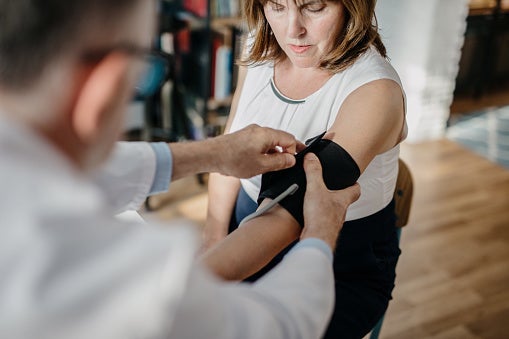High blood pressure is 2 times more likely to strike a person with diabetes mellitus. Left untreated, high blood pressure can cause serious health problems. These include:
-
Heart disease
-
Kidney disease
-
Eye problems
-
Stroke
A person with diabetes and high blood pressure is 4 times more likely to have heart disease. And 2 out of 3 adults with diabetes have blood pressure higher than 130/80 mm Hg (see below). Or they use prescription medicines for high blood pressure.
Diabetes and high blood pressure also share common risk factors. These include obesity, aging, and lack of physical activity.
What is high blood pressure?
Blood pressure is the force of blood pushing against your artery walls. Each time your heart beats, it pumps blood into these arteries. The highest blood pressure occurs when your heart beats and is pumping blood. High blood pressure raises the risk of heart attack and stroke. The heart works harder to circulate blood when pumping against high blood pressure.
Two numbers are used to measure blood pressure:
-
Top number (systolic pressure). This is the pressure inside the artery when the heart beats. This is when blood is pushed out of the heart and into your circulation.
-
Bottom number (diastolic pressure). This is the pressure inside the artery when the heart rests between beats. This is when the blood is circulating within the arteries of the heart to keep the heart nourished.
Both the systolic and diastolic pressures are recorded as mm Hg (millimeters of mercury).
Blood pressure is grouped as normal, elevated, or stage 1, stage 2, or stage 3 high blood pressure:
-
Normal blood pressure. lower than 120/lower than 80
-
Elevated blood pressure. 120 to 129/less than 80
-
Stage 1 high blood pressure. 130 to 139/ or diastolic between 80 and 89
-
Stage 2 high blood pressure. 140 or higher/ or 90 or higher
-
Stage 3 high blood pressure. 160 or higher/or 100 or higher
Your healthcare provider will recommend a blood pressure goal for you. This will be based on your own unique circumstances.
What are the symptoms of high blood pressure?
Symptoms can be different for each person. Usually people with high blood pressure don't have symptoms. If your blood pressure is very high, you may have these symptoms:
-
Headache
-
Dizziness
-
Blurred vision
The symptoms of high blood pressure may look like other health conditions or problems. Always talk with your healthcare provider for a diagnosis.
Preventing high blood pressure
These tips can help prevent high blood pressure:
-
Have regular medical checkups that include blood pressure measurements.
-
Reduce your salt intake.
-
Eat whole-grain breads and cereals.
-
Try stress-relieving activities.
-
Exercise regularly.
-
Get to and stay at a healthy weight.
-
Don't drink too much alcohol.
-
Stop smoking and stay away from secondhand smoke.
-
Check your blood pressure at home. Write the measurements down and bring them with you to your medical visits.
Treatment for high blood pressure
Treatment will depend on your symptoms, age, and general health. It will also depend on how severe the condition is.
Treatment may include exercise, a balanced diet, and quitting smoking. Your healthcare provider may also prescribe medicines.


